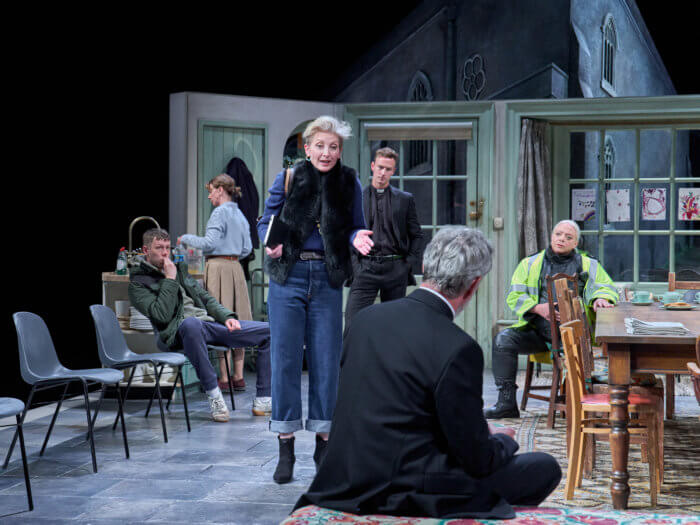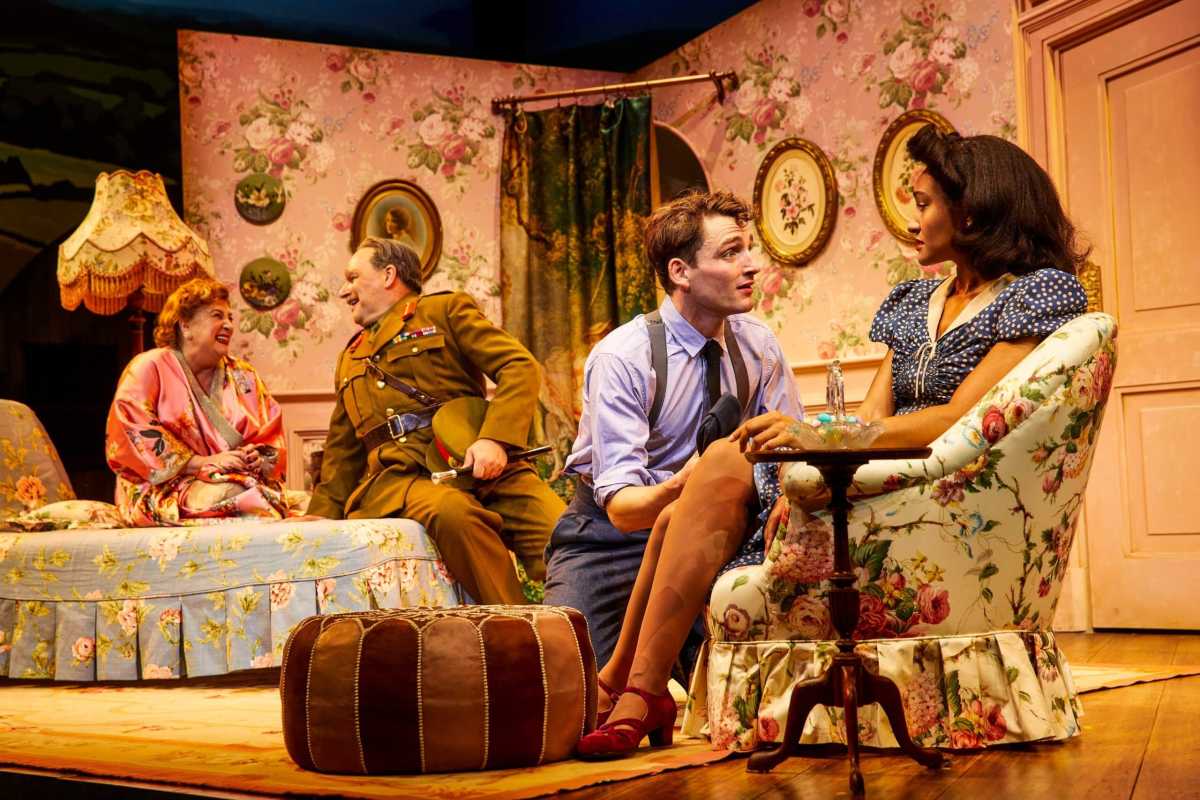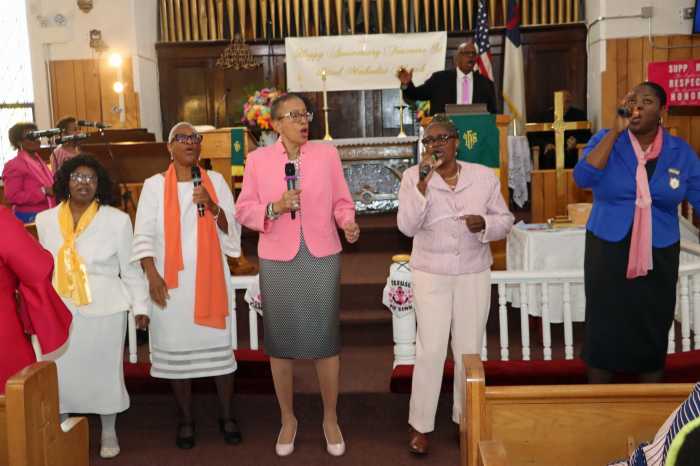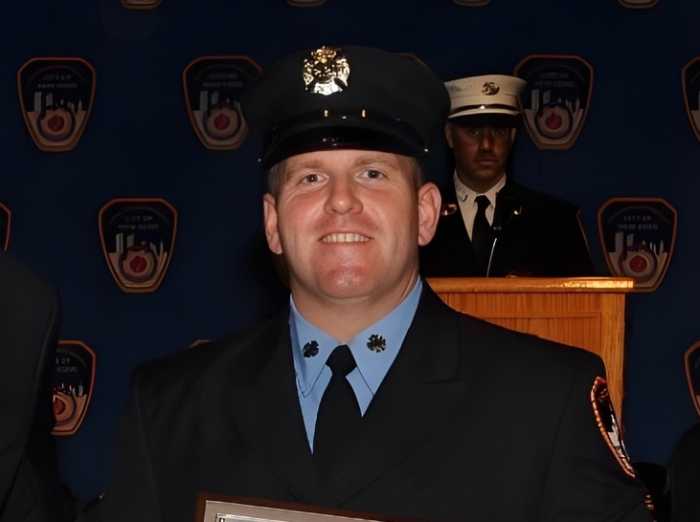I had not been to London since December 2019 (“the time before”) and with the B.5 COVID surge, Heathrow Airport chaos, and a record-breaking heat wave in late July, I hesitated about returning. But while the sunny, warm and very un-English dry weather is tolerable (if alarming from an existential point of view), I was welcomed by air-conditioned theaters hitting their strides.
The National Theatre alone is serving up three hits: two uproarious comedies (a Shakespeare and a new take on Sheridan) to cheer us up and a riveting drama of people who are differently abled, which is, as the title has it, “All of Us.”
“Much Ado about Nothing” at the National’s Lyttleton has never been funnier or better. Director Simon Godwin, artistic director of the Shakespeare Theatre Company in DC, sets it in and around a fancy Sicilian hotel in the deco 1930s, oddly without a whiff of fascism but a spirit more suggestive of a Fellini movie in the 1950s.
While the middle-aged reluctant lovers Benedick (John Heffernan) and Beatrice (Katherine Parkinson) are the fine leads, there was not one member of the diverse cast who was not firing on all cylinders. Comedy is serious business and each player resists any impulse to mug or wink at even the lowest of characters — making them believable, if mad human beings caught up in this roller coaster of a tale of love, jealousy, revenge, and reconciliation — and, of course, marriage. (It’s a comedy!) (To Sept. 10 and broadcast on NT Live Sept. 8. More info on US screenings here.)
“Jack Absolute Flies Again,” directed by Emily Burns at the big Olivier at the National, is an even broader comedy from the team (Richard Bean and Oliver Chris) that gave us “One Man, Two Guv’nors” — for which James Corden won the Tony — and here come through with almost non-stop gags. “Jack” moves Richard Sheridan’s 1775 “The Rivals” to a World War II air base outside an English manor house complete with Mrs. Malaprop (Caroline Quentin). Handsome, rich ace Jack Absolute (Laurie Davidson) pines for Lydia Languish (Natalie Simpson), a spirited, beautiful, and conflicted feminist flier.
Bean and Chris send up liberals and conservatives, walking a comedic tightrope since pilots from Australia, India, and Yorkshire are not as much made fun of as had fun with. But the most hilarious character of all is the English bulldog military man, Sir Anthony Absolute (Peter Forbes), Jack’s almost impossibly reactionary father, who is determined his son marry who he damned well says to — with unintended consequences.
It’s not all fun and games and romance. There is a war on after all. And this welcome entertainment — which borrows from movies made during the war as much as it does “The Rivals” — makes us care about this motley crew that helped save Europe from fascism. (To Sept. 3 and in cinemas via NT Live from Oct. 6.)
I went to Francesca Martinez’s “All of Us” (to Sept. 24) at the National’s Dorfman, directed by Ian Rickson, unfamiliar with her, a comedian with cerebral palsy — a self-described “wobbly” person. She plays Jess, a thoughtful and contained therapist: a helper who doesn’t like asking for help and manages fine with a little aid from the state. But the play is about what happens to people with disabilities when government heralds a need for “austerity” and cuts basic support when all it really wants to do is kill off “the surplus population,” as Scrooge put it.

In ten years of Tory cutbacks on aid, Martinez said in an interview, there were 130,000 preventable deaths as people lost the help that let them function and integrate into society. And she brings political truth right into her play, noting that 60% of deaths from COVID in the first year of the pandemic were among people with disabilities.
But lest you think this is just agitprop — and it does contain two gripping town meetings where people with disabilities take on a Tory MP feigning concern — “All of Us,” like Larry Kramer’s “The Normal Heart,” is an absorbing human drama full of love and friendship as well as struggles and despair. My interest never flagged once during its three hours. (And while the Torys come in for condemnation, wait until you hear their assessment of the US “safety net.”)
Jess’ lesbian best friend and roomie Lottie (Crystal Condie) stands in for many of us temporarily non-disabled people wanting to be there for Jess but feeling shut out at times. Francesca Mills’ Poppy, her sassy, sexy, and uncompromising friend, is a breathtaking creation, whether tooling around the stage in her motorized wheelchair, getting it on with her latest beau, or reading an elected official the Riot Act.
Kudos to the National’s artistic director, Rufus Norris, for getting his indispensable theatre through the pandemic and bringing it to such new heights.
“Patriots,” by Peter Morgan at the Almeida (to Aug. 20), could not be timelier — playing like a prequel to Russia’s war on Ukraine. It is centered on Boris Berezovsky (played with eye-popping arrogance and dark charm by Tom Hollander), the oligarch who made Putin when Yeltsin faltered and who, like Dr. Frankenstein, can’t control his own creation. Boris also makes budding oligarch Roman Abramovich (Luke Thallon) spectacularly wealthy, but no good deed goes unpunished in “Patriots.”
Will Keen is nothing less than bone-chilling as Putin, even as he starts out as a reformer who says he wants to work with the West. But the only methods this former KGB man knows are ruthless.
The show plays out on a set that looks like the runway of a strip club as it indeed peels away the illusions that these men have of being patriotic Russians. They are driven by self-aggrandizement and greed, whether for money or power. The Russian people get it in the neck but seem to eat it up — just as so many Americans cannot get their fill of Trump.
It is a play that is bracingly of the moment, directed by Rupert Goold.
Stephen Beresford’s “The Southbury Child,” at Nick Hytner’s Bridge Theatre and directed by him, takes place wholly in a vesting and meeting room of an Anglican parish. What starts out almost as a sitcom turns dark, as vicar David Highland (Alex Jennings) plans the funeral of a child with the kid’s father and mother who want to Disneyfy it with festive balloons. The priest gently but firmly insists on sticking to the book’s official rite for the departed even though doing so threatens his own position in the church and in the community.

There is also his long-suffering wife, Mary (Phoebe Nicholls, so good as the serious child in “Brideshead Revisited” 40 years ago) at the limit of her patience and the bright new gay assistant priest (Jack Greenlees) in a church that he loves but that doesn’t love his love. It is Jennings, however, who holds the whole thing together as his world spins apart. It is a remarkable star turn from an actor who has given us so many spot-on performances of complicated people, from portraying playwright Alan Bennett in the movie of “The Lady in the Van” to Prince Charles in “The Queen” to the Duke of Windsor in TV’s “The Crown.” Hang in there for the moving second act.
Derek Jarman, the pioneering and uncompromising gay artist and filmmaker who died of AIDS in 1994 at 52, is being brought to vivid life in Mark Farrelly’s one-man “Jarman” (to Aug. 26) at Islington’s King’s Head Theatre Pub, one of several LGBTQ-themed shows on there (all the more important since the all-LGBTQ “Above the Stag” fringe theatre abruptly closed). As bad boy director Ken Russell told Jarman early on as they worked together, “Be astonishing or f—k off.” And so Derek was as an activist and artist making groundbreaking gay-themed films on St. Sebastian (in Latin!), Caravaggio and Edward II and his swan song “Blue”—a single blue screen plus narrative as he was going blind from AIDS complications in 1993.
“I’ll be brief,” Farrelly/Jarman says at the outset, “Not because my time is limited. Because yours is. You are living ever less brave lives.” He takes us on his artistic/activist journey and beckons us to take our own. He fought government homophobia and his own AIDS — not unlike challenges we face today, but we’ll need more of his creativity if we’re to prevail. “Don’t want to end in sadness,” he says. “I’m an artist of happiness.”
I also visited the new “Queer Britain” museum at 2 Granary Sq. near Kings Cross featuring a small but potent exhibit of historic LGBTQ+ cultural and political photos, artworks, and artifacts — most notably the very door at Reading Gaol where Oscar Wilde was imprisoned for two years at hard labor for “buggery” in 1895 at the height of his fame and where he wrote “De Profundis” to his lover Bosie. (He died just two years after release.) Attracting thousands of visitors since its recent opening, this exhibit is set to welcome visitors to 2025. More info here.
COMING UP: At the National, Arthur Miller’s “The Crucible” (Sept. 14-Nov. 5), “Blues for an Alabama Sky” (Sept. 20-Nov, 5), “The Boy with Two Hearts” (Oct. 1-Nov. 12), and “Hex” (Nov. 26-Jan. 14), a musical retelling of “Sleeping Beauty” directed by Rufus Norris. “Cruise” at the Apollo (to Sept. 4) is the Olivier-nominated true story of what is supposed to be the last day on earth in 1988 for Michael Spencer, gay and HIV+. There is a hit musical based on the letters of gay icon and code-breaking war hero Alan Turing on at the Edinburgh Festival that may get a London transfer. The Almeida is premiering “The Clinic” by Dipo Baruwa-Etti (Sept. 3-Oct. 1). Juliet Stevenson in“The Doctor” based on a Schnitzler play at the Duke of York’s (Sept. 29-Dec. 11). For more info on these and all upcoming shows, go to www.londontheatre.co.uk

















